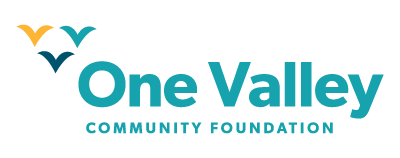FAQs
What is a community foundation and how does it work? Learn about One Valley, its work, and how you can get involved. We have compiled our most frequently asked questions and provided the answers to make it easy to get the information you need.
-
Community foundations are tax-exempt public charities that serve local philanthropists who wish to take an organized approach to giving. Community foundations are public nonprofits, so their philanthropists enjoy increased tax advantages not available to private foundation donors. Community foundation philanthropists also receive professional support. Unlike private foundations, community foundations invest and administer a pool of funds contributed by numerous philanthropists. Together, these philanthropists create an endowment, which is like a community savings account, to ensure the long-term health of the nonprofit community.
-
A community foundation is run by an independent governing body representing the broad interests of the community, with members of the board serving limited terms. The board is responsible for seeing that a reasonable rate of return is achieved on all funds entrusted to the foundation along with a few other obligations.
-
A community foundation actively seeks contributions from a wide range of donors and foundations and provides assistance to those donors in fulfilling their philanthropic interests.
-
The unrestricted funds of the foundation are awarded in a competitive process to non-profit agencies in the community. These agencies must be qualified 501(c)(3) organizations.
-
Visit our Grants page to see current opportunities.
-
As our community foundation grows, we aspire to provide leadership on community issues by serving as a facilitator, convener, or mediator around significant community discussions. Additionally, we can serve as a fiscal sponsor by offering our legal and tax-exempt status to groups engaged in activities related to our mission.
-
Yes. We help donors achieve their philanthropic goals in the Gallatin Valley and beyond.
-
There are a variety of ways. A family may choose to establish a named fund that bears their family name and continues their community giving in perpetuity. A community group may decide to establish a fund in honor of, or memory of, a friend or community leader. A business may choose a community foundation to help with its grant making, thus saving time and personnel for the business, yet assuring support for their selected charitable interests. Some donors choose to make their community philanthropy anonymous and the foundation is a perfect partner to help them. Nonprofit agencies often establish their endowments within a community foundation to guarantee their endowment donors that the principal of the gift is never disturbed and the earnings will forever come to the agency.
-
One Valley Community Foundation pays fees for professional investment management and portfolio oversight. We also charge a fee for the services we provide. Fees vary from .5% to 1.5% according to the fund type, size of the fund, and services provided.
-
We currently partner with Lauren Peck, Certified Financial Planner and D.A. Davidson. The foundation establishes the philosophy and policies for investments, but the professionals handle day-to-day decisions. To learn more, visit the Advisors page on our website.
-
Investment experts are chosen by our finance committee. One Valley’s board and staff qualify recommended advisors after reviewing the advisor’s credentials and proposal for investment policy, asset allocation, investment selection, and fees. Visit our Professional Advisors page for more information.
-
It is a simple process involving a meeting with a representative of the foundation and the donor to review the fund agreement form and determine the donor’s desires and the most suitable way to accomplish them. Once the donor and other appropriate counselors of the donor approve the form, the initial contribution is made and the fund is established. Generally, the fund needs to be approved and accepted by the board of One Valley at its next meeting.
-
The foundation is able to accept gifts of appreciated securities (which are particularly advantageous to the donor), real property, or in some cases, personal property. The community foundation offers the maximum charitable deduction available for estate and gift planning opportunities. The foundation is generally able to provide information on giving techniques and assist donors to evaluate the most effective ways to accomplish their charitable goals.
-
A United Way does a great job of serving its member agencies, which are community health and human service organizations. It makes annual distributions for general operating support to these agencies based on its annual fund drive proceeds. The community foundation supports all areas of the community – arts and culture, education, health and human services, recreation, and civic affairs – and has no members who are guaranteed annual gifts. It distributes earnings in a competitive grant making process, generally on a one-year only basis. The community foundation distributes only the earnings from its endowment and not all of the money that it holds. The community is well served to have both a United Way and a community foundation.
-
The Montana Endowment Tax Credit offers individuals, corporations, small business corporations, partnerships, trusts, and estates with qualifying contributions a credit of 20% of a direct charitable gift made to qualified endowments or 40% of the present value of a planned gift, up to $15,000. This credit is nonrefundable and can’t be claimed on any portion of a gift taken as a deduction under 15-30-2131 or 15-31-114, MCA. Montana is one of the few states that offers this type of tax credit. Learn More
